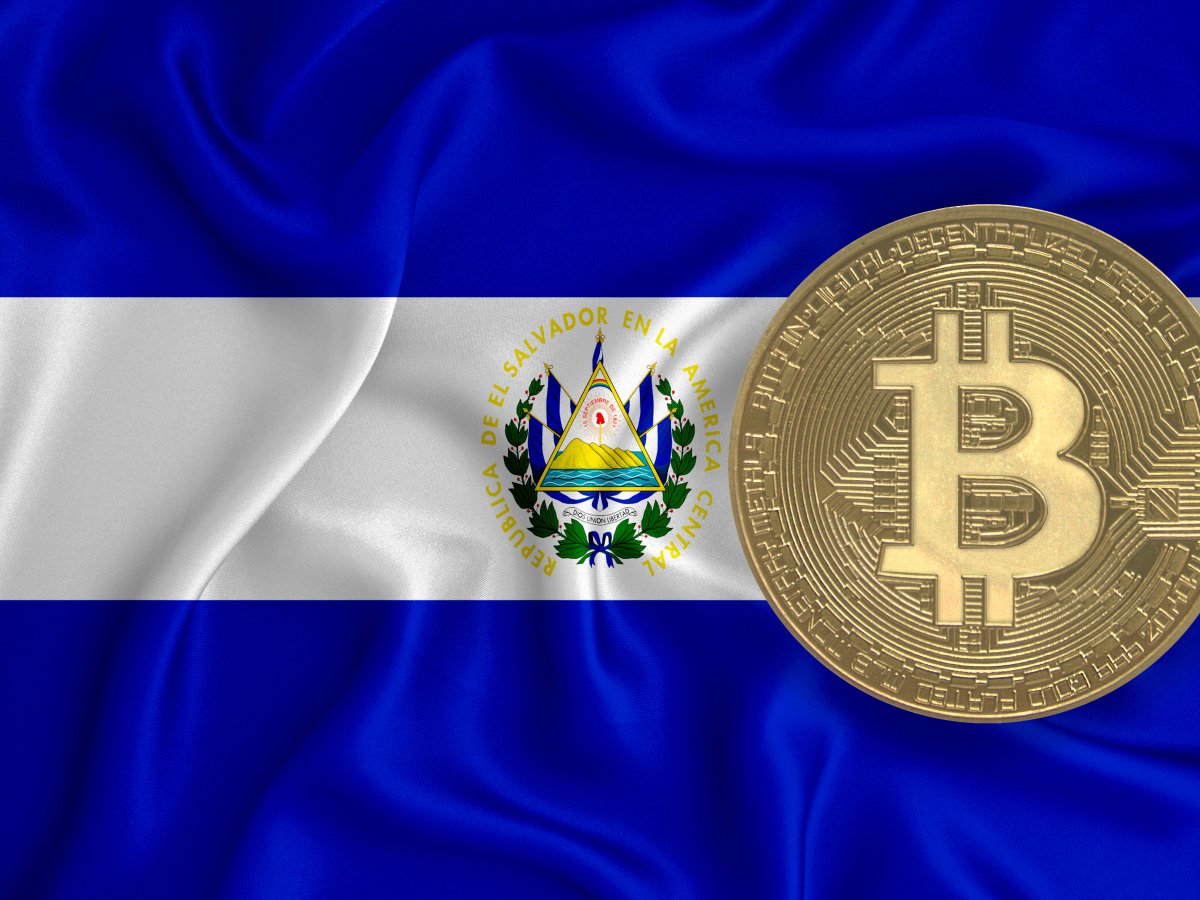Many don’t understand or trust Bitcoin, or shun its huge fees. There are worries that the global money-laundering police are poised to crack down, and the experiment has so undermined confidence in its showboat president’s economic program that his nation’s debt is now selling for 36 cents on the dollar.
Yet many of the crypto community’s most influential commentators are still praising the daft scheme. In a recent interview, ARK Invest CEO Cathie Wood raved that adopting Bitcoin has more than doubled the ranks of Salvadorans “with access to new banking services and new financial services.”
El Salvador was doing fine with the dollar when Bitcoin became “forced tender”
It’s important to grasp how the new Bitcoin regime upended a period of stable money and forces banks and merchants to accept a wildly volatile currency they don’t want, and that can’t work.
In 2001, the Central American nation of 6.4 million made the daring decision to scrap the colón and “dollarize” its economy by taking the greenback as coin of the realm. “I had a hand in that,” Steve Hanke, professor of applied economics at Johns Hopkins University told me.
Indeed, Hanke played a pioneering role in counseling Latin American governments on the benefits of embracing the dollar some 20 years ago. He had previously served as an adviser to the minister of finance in Ecuador when El Salvador’s neighbor adopted the dollar—Hanke’s known in Ecuador as “the Dollarizer.”
Around that time, he discussed the impact of making the move at length with El Salvador’s finance minister Manuel Hinds, a former World Bank economist and a close friend. Hinds was the architect of his nation’s landmark conversion the following year.
“El Salvador made the dollar legal tender, but it allowed any other currencies to be legal as well,” says Hanke. But the shift to dollars worked great, banishing any thoughts of using an alternative. Over the next two decades, the nation enjoyed average inflation of just 2.03%, mirroring the U.S. trajectory.
Its mortgage rates were stable and moderate for a developing nation at 7%, and its economy—though plagued by widespread poverty—grew at better than the average of its Latin American neighbors.
Despite that exemplary monetary record, following his election in May 2019, then 37-year-old President Nayib Bukele hitched his economy’s future to Bitcoin.

Last June he pushed through a law that made Bitcoin a second official currency. But the rules applying to Bitcoin marked a stunning departure from the former template that had worked so well.
Bukele, a former publicist who sports baseball caps worn backward, blue jeans, and aviator shades, is a self-styled revolutionary who called himself “the world’s coolest dictator” before switching monikers to “CEO of El Salvador.” His new law wasn’t about choice.
It requires all merchants and banks to accept Bitcoin for payment from any consumer or other business that wants to pay with Bitcoin.
“Even today, no one has to accept the dollar for payment,” says Hanke. “So Bitcoin isn’t legal tender like the dollar. It’s forced tender. It’s what the Soviet Union imposed in banning all other currencies, or what nations demand when they conquer other nations.”
As we’ll see, the forced use of Bitcoin will prove its downfall. The banks that have no choice but to accept Bitcoin won’t be able to comply with the stringent, looming rules that would make the king of crypto unworkable inside El Salvador’s borders.
The reasons for adopting Bitcoin were bogus
“The big question is, ‘Why would you use Bitcoin in the first place?'” asks Hanke. “Why would you want to change anything?”
Bukele’s justification was that the newcomer would greatly improve “financial inclusion” by giving a wide swath of the 70% of Salvadorans who lack bank accounts access to financial services. At first glance, Bukele’s main argument appeared to make sense and drew international acclaim that made him something of a folk hero in crypto circles.
El Salvador’s economy relies heavily on “remittances,” payments to families from relatives or friends working abroad. Those transfers account for one-quarter of its GDP, the highest share of any country in the Western Hemisphere.
Bukele wrongly argued that the processors exacted huge fees that greatly diminished the dollars his people collected from Western Union, MoneyGram, or Ria. Deploying Bitcoin, he trumpeted, would make remittances far cheaper, leaving more money for Salvadorans and ushering millions into the financial mainstream.
“That was a typical lie,” says Hanke. He cites that El Salvador’s remittance costs rank sixth lowest in a survey of 104 countries at 2.8%. “The law backfired by greatly increasing remittance costs using Bitcoin,” says Hanke.
But he adds that it accomplished Bukele’s true objective by strengthening his grip on the nation: “He forces his enemies to follow the Bitcoin law, and if they don’t, he puts them in jail, and he lets his friends ignore the law.”
Bitcoin’s downsides: Businesses and consumers don’t want it, and it’s incredibly expensive for remittances
Bukele attracted users by giving everyone who signed up for the government’s app a $30 bonus in Bitcoin, held in a digital wallet called Chivo, El Salvadoran slang for “cool.” “He had to bribe people to sign up,” says Hanke.
But the millions who got Chivo mostly cashed $30 in crypto for dollars, and dumped the app. One problem is a widespread lack of familiarity with Bitcoin. A survey by Central American University found that nine out of 10 Salvadorans didn’t know what Bitcoin was, and that eight in 10 didn’t trust it.
The government frustrated potential users by botching the launch in September. Folks couldn’t exchange their Bitcoin for cash when the app frequently failed to connect to the nation’s few Bitcoin ATMs. Nor did folks embrace Bitcoin for what was advertised as its main appeal: low-fee, superconvenient remittances.

In fact, dispatching funds in the virtual coins is shockingly costly—on both ends of the transaction. Exchanges such as Coinbase charge the sender commissions of 2% to 4% for changing dollars for Bitcoin.
When the Bitcoin arrives in San Salvador or Santa Ana, it posts in the recipient’s Chivo wallet. But the Salvadorans don’t want Bitcoin. So they go to an ATM, where they can use the app to get dollars.
The ATM provider takes a 5% cut, and pays more fees to the network that handles the exchange from coins to dollars. Hanke puts the total cost at 7.0% to 9.5% a transfer, as much as three-and-a-half times the expense of traditional remittances, and he thinks even 9.5% may be a low number.
And that doesn’t include the inconvenience of traveling to the ATM, which are scarcely distributed, or the risk of getting mugged while counting your cash. Over 80% of the people surveyed by the El Salvador Chamber of Commerce said that they don’t want remittances in Bitcoin, and over nine in 10 rejected the idea of taking their salaries in coins.
Global policemen may soon crack down
Hanke predicts that the anti–terrorism-and-money-laundering police force that spans national borders will soon put El Salvador in the penalty box. When the intergovernmental Financial Action Task Force (FATF) finds or suspects that a nation engages in such wrongdoing, it places its government on a “gray” or “black” list that imposes severe reporting requirement on banking and business transactions, and especially those in virtual assets.
For Hanke, a signal that the FATF may be ready to pounce is a U.S. State Department’s conviction that Bukele is heading a corrupt regime.
Bukele’s handpicked legislators recently nixed a law barring presidents from successive reelection, contrary to the nation’s constitution, and in response, the State Department issued a scalding press release titled, “Salvadoran Re-Election Ruling Undermines Democracy.”
“Now, El Salvador is positioned to violate the FATF’s virtual asset regulations,” writes Hanke. If it goes on the gray list, he says, its banks and businesses will face two dozen tough reporting regulations that will be virtually impossible to fulfill.
“The Bitcoin transactions are all about anonymity,” he says. “If the FATF takes action, anyone who opens an account will have to comply with ‘know your customer’ rules that require the disclosure of the source of the funds and details on every transfer.”
In his view, an FATF crackdown is practically inevitable and would kill any chance that Bitcoin could serve as a viable currency.
El Salvador’s finances are in shambles
The heavily indebted nation is seeking a $1 billion loan from the IMF and also courting aid from the World Bank. But Bukele’s getting nowhere with both, and the IMF has strongly criticized his crusade to create the first Bitcoin-powered economy.
In late November, Bukele unveiled his nuttiest idea yet, a plan to build a Bitcoin City on the Gulf of Fonseca, funded by a $1 billion bond offering, $500 million of which would be deployed to speculate in Bitcoins! Practically overnight, the price of sovereign bonds dropped from 75 cents to 63 cents of their par value, on its way to its current level of 36 cents.
“El Salvador now has the most distressed sovereign debt in the world, and it’s because of the Bitcoin folly,” says Hanke. “The markets think that Bukele’s gone mad, and he has.”
The tragedy in El Salvador shows that Bitcoin’s a disaster for buying and selling things, and that the dollar’s a matchless currency. For a while, a flamboyant promoter marketed his fantasy to other zealots who want to believe. The test was selling it to his own people. They weren’t buying.
Read full story on Fortune Magazine



